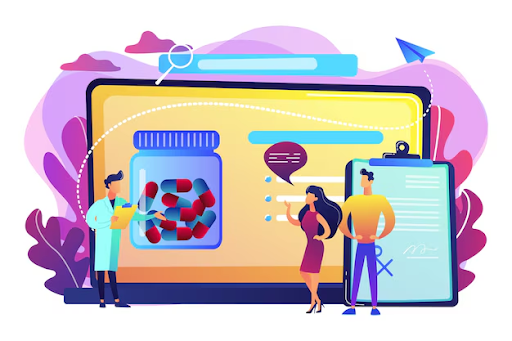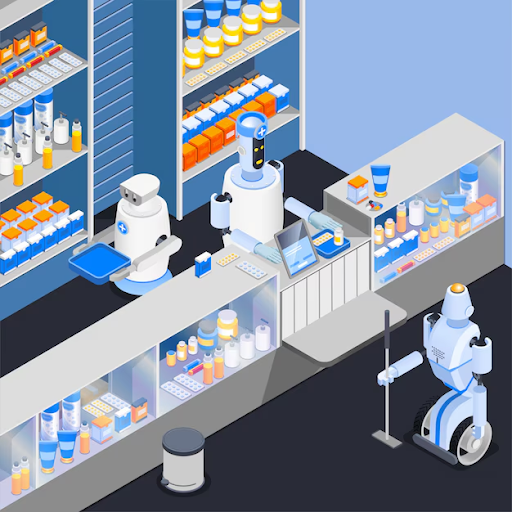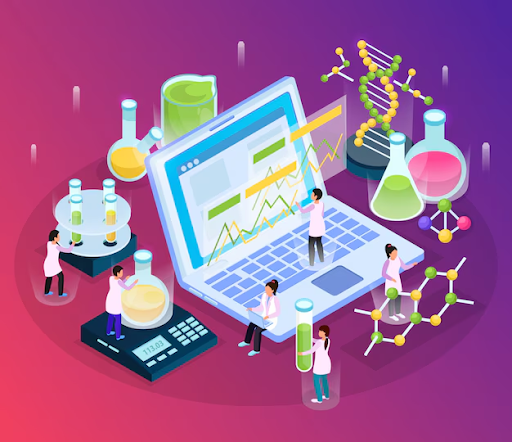Amid the complex maze of processes, vast data, and rapidly changing demands, managing and operating a pharmaceutical business has become more challenging than ever. Is there a comprehensive solution to help pharmaceutical businesses overcome these challenges and achieve sustainable growth?
The answer lies in the application of information technology, especially ERP software in the pharmaceutical industry. In today's article, we will explore why ERP has become a "powerful ally" for pharmaceutical companies and how to maximize the potential of this system.
1. Characteristics of the pharmaceutical industry
The pharmaceutical industry is one of the special industries, requiring precision, meticulousness, and strict adherence to regulations. To gain a better understanding of this industry, we need to consider some of its prominent characteristics .
- Strict and complex legal regulations: The pharmaceutical industry is subject to strict management by state regulatory agencies regarding the quality, safety, and efficacy of products. These regulations pertain to the entire value chain, from research, development, production, storage, transportation to distribution. Compliance with these regulations is a prerequisite for pharmaceutical products to be marketed.
- GMP (Good Manufacturing Practice): It is a mandatory standard for good manufacturing practices, ensuring that pharmaceutical products are produced under hygienic, safe conditions and with stable quality.
- GSP (Good Storage Practice): Regulations on good storage practices, aimed at preserving drugs under proper conditions, preventing deterioration and degradation.
- GLP (Good Laboratory Practice): Standards for good laboratory practices, applicable to research and development activities for new products.
- GDP (Good Distribution Practice): Regulations on good distribution practices, ensuring that drugs are distributed to consumers safely and effectively.
- The diversity and complexity of the products: Pharmaceutical products are extremely diverse in terms of types, ingredients, dosages, forms of preparation (tablets, capsules, solutions,...) and treatment indications. Each type of drug has its own unique characteristics, requiring different production, storage, and transportation processes. In addition, the lifecycle of pharmaceutical products is often short, requiring companies to continuously update and innovate their products.
The supply chain is complex and lengthy: The supply chain in the pharmaceutical industry is often very long and complex, including many stages such as:
- Research and development: The process of research and clinical trials to create new products.
- Production: Manufacturing raw materials, formulating finished products, packaging.
- Quality control: Inspecting and evaluating the quality of products at different stages.
- Storage: Preserve the medicine under appropriate conditions.
- Transportation: Transport the medicine to distributors and pharmacies.
- Distribution: Distributing drugs to medical facilities and consumers.
- High requirements for accuracy and safety: Even a small mistake in the production, storage, or distribution process can have serious consequences for patient health. Therefore, the pharmaceutical industry requires absolute accuracy and safety at every stage.
- High competition pressure: The pharmaceutical industry always faces fierce competition pressure from both domestic and foreign rivals. To survive and thrive, pharmaceutical companies must continuously improve their products, enhance service quality, and reduce production costs.
2. What is the application of ERP systems in the pharmaceutical industry?

Applying the ERP system in the pharmaceutical industry is the process of implementing and using ERP (Enterprise Resource Planning) software to manage all processes, activities, and data of pharmaceutical enterprises. The goal is to optimize operations, ensure compliance with legal regulations, and increase business efficiency.
Applying ERP systems in the pharmaceutical industry not only helps businesses operate more efficiently but also ensures compliance with strict standards, thereby enhancing the reputation and quality of products in the market. This is an important step for pharmaceutical companies to develop sustainably in the context of increasingly fierce competition.
3. Challenges in the pharmaceutical industry

From ensuring quality standards and compliance to managing inventory at all levels, managing a pharmaceutical business can be stressful. Whether starting as a drug manufacturer or managing a growing pharmaceutical company, having pharmaceutical ERP software is a one-stop solution.
Here, we have listed the common challenges that most pharmaceutical businesses face and the reasons why you should implement ERP software in the pharmaceutical industry.
Government regulations change
The regulations issued by the government regarding software for the pharmaceutical industry are always changing. To ensure patient safety, accuracy is of utmost importance and cannot be overlooked. Therefore, pharmaceutical companies face many challenges in meeting international quality standards and adapting to changes in drug and healthcare regulations.
Supply chain disruption
The downtime of the supply chain can significantly affect the workforce and output of the company and can even damage your reputation in the eyes of potential customers. To manage the supply chain seamlessly, businesses must have the ability to address the unique needs and challenges of the supply chain, such as procurement, order management, transportation & logistics, etc.!
Quality control
Quality control in the pharmaceutical business cannot be overlooked or underestimated. Therefore, it is important to ensure strict quality standards to achieve safety, efficacy, and compliance. When many inspections, audits, and documentation are carried out, the quality control process can become very complex and sometimes can only be managed through manual operations or outdated systems.
Big data management
The pharmaceutical industry generates a massive amount of data every day from various sources such as MES systems, ERP, laboratories, warehouses, sales, and more.Data in the pharmaceutical industry includes various forms such as numerical data, text, images, videos... The amount of data increases rapidly over time, requiring the management system to have scalability. Data in the pharmaceutical industry is often very sensitive, related to patient information, production formulas... Therefore, data security is extremely important.
4. Benefits of implementing an ERP system in the pharmaceutical industry

Investing in an advanced pharmaceutical ERP solution is not just an option, but also a decisive factor for your business's success in the highly competitive pharmaceutical industry. When equipping your team with a powerful management tool, you are opening up new opportunities to optimize processes, enhance production efficiency, and ensure product quality.
Effective quality management
ERP supports the construction and management of the quality management system, ensuring compliance with GMP standards. ERP helps build and maintain a stringent quality management system, ensuring compliance with international standards such as GMP and GSP. All information about raw materials, production processes, and quality testing is recorded and managed in detail and transparently, helping to minimize risks and enhance the product's reputation.
Improving inventory management
Inventory management is very important for pharmaceutical businesses to ensure that critical raw materials are available for timely delivery of medications to patients in need. The support of AI-enabled pharmaceutical ERP software helps businesses accurately assess inventory levels through real-time tracking modules.
The real-time tracking modules allow for monitoring batch numbers, expiration dates of specific products, and the timing for inventory replenishment. This advanced pharmaceutical ERP module has greatly contributed to an organization's efforts to mitigate the risk of inventory shortages, as evidenced in the documentation.
Production planning
Pharmaceutical ERP management software can effectively manage production planning by maintaining and ensuring market demand for the product. Additionally, it benefits the business in many ways, including workload allocation, demand planning, monitoring production efficiency, and examining machine conditions.
Quality control standards
Pursuing quality is the main driving force of pharmaceuticals, a segment of the economy where compromise is not feasible because it directly interacts with consumers. The presence of pharmaceutical ERP solutions demonstrates the industry's appreciation for quality systems, where these systems come with the additional advantage of automated quality assessment.
Ensuring compliance with legal regulations
Ensuring strict compliance includes a series of essential and complex activities, and if overlooked, it can threaten the company's reputation. A reliable ERP solution ensures that a product meets stringent quality and compliance regulations, such as those set by the FDA (Food and Drug Administration), before the final product is brought to market.
Improving financial management efficiency
ERP connects and unifies all financial data from different departments (production, sales, purchasing,...) into a single platform. This helps eliminate errors arising from manual data entry, ensuring the accuracy and consistency of information. ERP automates accounting processes such as invoicing, accounts reconciliation, cost management, etc. Minimize human intervention as much as possible, saving time and manpower.
5. Applying modern technology in ERP for the pharmaceutical industry

The application of modern technology in ERP systems in the pharmaceutical industry not only helps improve financial management efficiency but also brings many other comprehensive benefits. Here are some notable technology applications:
Artificial Intelligence (AI) and Machine Learning:
Demand forecasting: AI can analyze historical data and market trends to accurately forecast customer demand, helping to optimize production and reduce inventory.
- Quality analysis: AI helps analyze images and sensor data to detect early errors in the production process, ensuring product quality.
- Process automation: Machine learning helps automate many repetitive processes, reducing human errors and increasing productivity.
Internet of Things (IoT):
Supply chain monitoring: IoT helps monitor the temperature, humidity, and location of products throughout the transportation process, ensuring quality and safety.
Asset management: IoT helps monitor the condition of machinery and equipment in factories, predict maintenance, and reduce downtime.
Blockchain:
- Origin management: Blockchain helps ensure transparency and traceability of raw materials and products, thereby enhancing customer trust.
- Data security: Blockchain helps secure sensitive data, prevent fraud, and ensure data integrity.
Big Data and Data Analytics:
- Process optimization: Big data analytics helps identify bottlenecks in production and distribution processes, optimizing them and reducing costs.
- Customer personalization: Analyzing customer data helps businesses better understand customer needs and behaviors, thereby developing appropriate marketing strategies.
Cloud Computing:
- Flexible and scalable: Cloud computing helps businesses flexibly scale their ERP systems up or down as needed, reducing initial investment costs.
- Access anytime, anywhere: Employees can access the ERP system from any device with an internet connection, enhancing connectivity and collaboration.
6. Notes when implementing ERP for pharmaceutical enterprises

The implementation of an ERP system for pharmaceutical companies is a process that requires thorough and careful preparation. To ensure success, businesses need to pay attention to the following issues:
- Clearly define the goals: What do you want to achieve from ERP (e.g., cost reduction, efficiency improvement), what functions are needed (production, finance, customer)?
- Choose the right supplier: Compare suppliers, prioritizing those who can customize the system according to business requirements.
- Detailed planning: Assign tasks, set timelines, and train employees.
- Thoroughly prepare the data: Review and reorganize the existing data.
- Testing and evaluation: Check the system before officially using it.
- Operation and maintenance: Continuous training, regular system updates.
7. Conclusion
In today's rapidly changing pharmaceutical industry, where issues such as strict compliance standards, diverse supply chains, and high-quality measures remain concerns, having the right tools is no longer a desire but a necessity. An ideal and advanced ERP system applied to the pharmaceutical industry will reduce the complexity of work and address issues related to compliance, efficiency, and decision-making requirements. Applying an ERP system in the pharmaceutical industry is an optimal solution for organizations looking to optimize key operations such as inventory, production scheduling, quality control, and compliance, allowing them to competitively provide essential drugs and pharmaceuticals to customers.